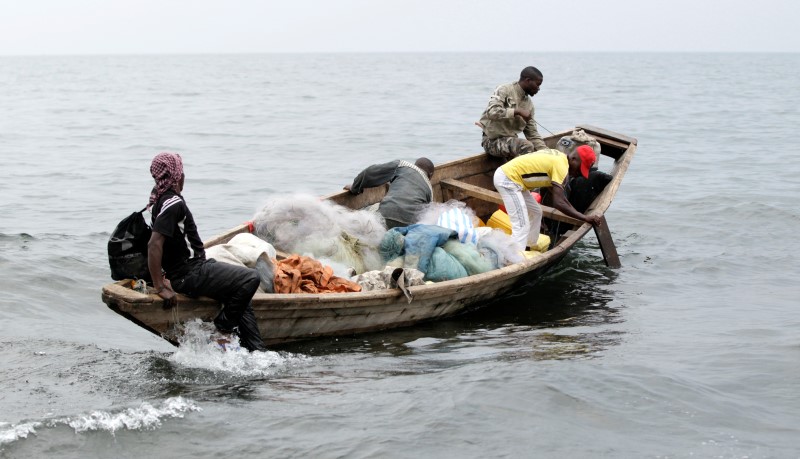By Clement Uwiringiyimana
LAKE KIVU, Rwanda (Reuters) - Some Rwandans tell stories of "demons" in Lake Kivu causing the deaths of fishermen and swimmers who have occasionally disappeared on one of Africa's great expanses of water in the heart of the continent.
Now Rwanda is turning the methane gas which can bubble up from the lake bed, sometimes with fatal consequences, into a lifeline by generating electricity to help businesses expand and light up a nation with a chronic power shortage.
Across Africa, governments are struggling to increase power capacity and expand grids to meet the demands of growing populations with rising aspirations. Poor electricity supplies are often cited as one of the biggest hurdles to investment.
Rwanda's KivuWatt plant, which started in May, is part of a network of projects aimed at providing 70 percent of the 11 million population with power from the grid or off-grid by 2018, up from 25 percent now. Much will come from renewable resources.
"The country cannot grow if you don’t have power," Jarmo Gummerus, country manager for the plant developed by U.S. company ContourGlobal, told Reuters on the lush shores of Lake Kivu, where a hi-tech barge gathers methane from the depths.
Rwanda, one of Africa's poorest nations but also among its fastest growing, is harnessing its limited solar, peat and hydro resources to curb the landlocked country's fuel import bill while keeping power flowing to spur on industry and create jobs.
Lake Kivu's methane has now been added to the list of its emerging resources, formed from biogas created by decomposing matter on the bed of the lake that is trapped by a layer of mineral-rich water flowing off nearby volcanic soil.
Left untapped, it could one day explode or, as in the case of another lake in Cameroon, poison inhabitants on shore if it bubbles up in large quantities, experts say. Some locals say it has already claimed unsuspecting victims on the lake.
"There are stories based on superstition that swimmers are taken away by demons," said Eric Manywa, 20, who sometimes takes a dip. "I don't believe that. It might be due to methane gas."
KivuWatt's Gummerus said the gas in the lake, which can bubble up, contains combustible methane - extracted for the power plant - mixed with other gas that is highly toxic. "It just kills almost immediately so it’s very dangerous."
His company is now carefully extracting the methane to power a 26 megawatt (MW) plant, with plans to increase that to 100 MW by 2020 at a cost of about $500 million to $600 million.
Despite that hefty investment, using domestic resources is a boon for a nation which has to truck all imports into the country about 1,400 km (870 miles) through Kenya or Tanzania, often along traffic-clogged roads that are poorly maintained.
POWERING BUSINESS
"Our power is much cheaper than the alternative which would be putting in diesel or heavy fuel," Gummerus said, adding the methane could also be processed for to sell as cooking gas.
Eventually, Rwanda could generate about 350 MW from methane, with a similar potential in the Democratic Republic of Congo, which shares the lake. Congo yet to tap the gas supplies.
The start-up of the KivuWatt plant is already benefiting local businesses in the region of rolling green hills and volcanic peaks, which the government wants to promote as a tourist destination.
“When I built this hotel in 2013, we could have power cuts every three hours, at least, but nowadays we have electricity 24/7,” said Jerome Musomandera, owner of the Kivu Plaza Hotel, one of a number next to the lake.
Some other hotels said they had yet to feel the benefit, but were hopeful that they would soon be able to unplug private stand-by generators and enjoy lower bills from grid power.
As it adds more supply, state-run Rwanda Energy Group (REG) is in talks with the regulator on lowering tariffs to help the poor and support industry, its chief executive Jean Bosco Mugiraneza said.
Rwanda now charges 17 U.S. cents per kilowatt hour (kwh) for industry and 21 cents for others. Mugiraneza did not say how much costs could fall by.
Rwanda's installed power capacity is now 190 MW and set to rise by the end of July to 205 MW, once a new peat-burning plant being tested is linked up. The aim is 583 MW by 2018, a goal Mugiraneza admits Rwanda would have to "work hard" to achieve.
"The government alone cannot afford to finance those 563 MW; that is why private investments are needed," he said.
KivuWatt was a pioneer by negotiating the first private power purchase agreement, helping pave the way for others.
Other deals that have been signed include one with U.S. firm Symbion Power, which plans a methane plant too. Another firm, Ignite Power, is helping the government to provide off-grid rooftop solar power panels to 250,000 households by 2018.
As well as helping meet Rwanda's national generation ambitions, Gummerus said the KivuWatt plant was boosting the local economy in the Kibuye region around the lake.
"If you came here eight years back when I came, there was nothing," he said. "It gives confidence for people to come and invest in Kibuye.”
